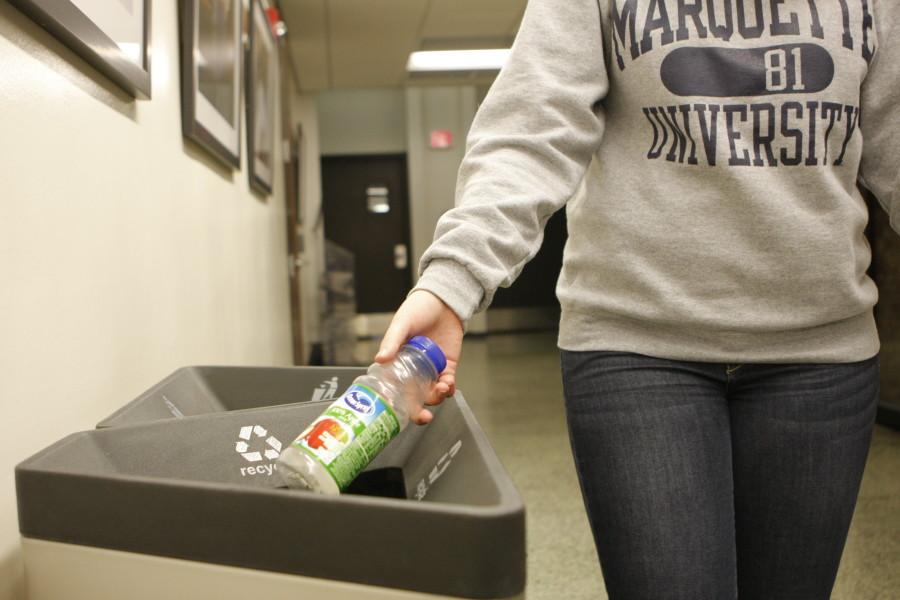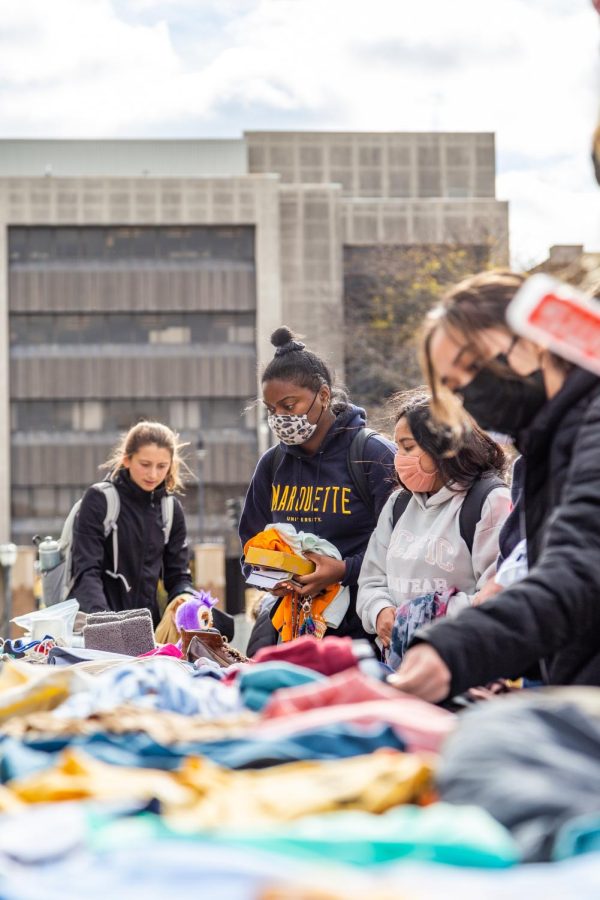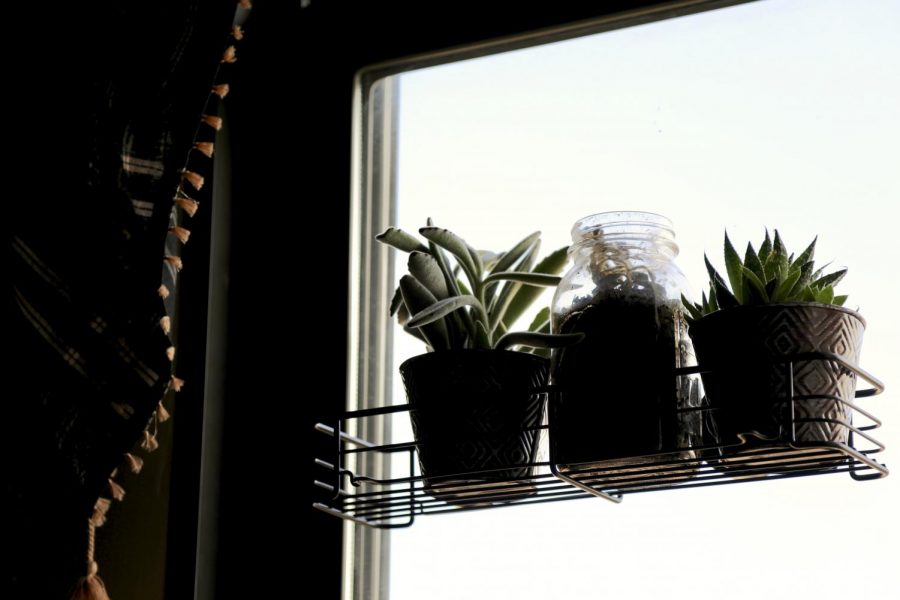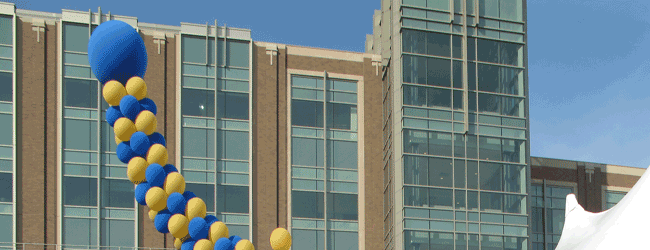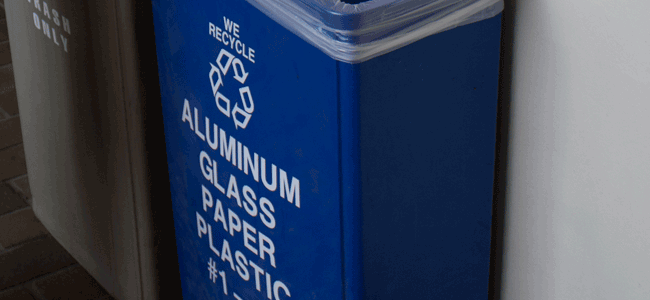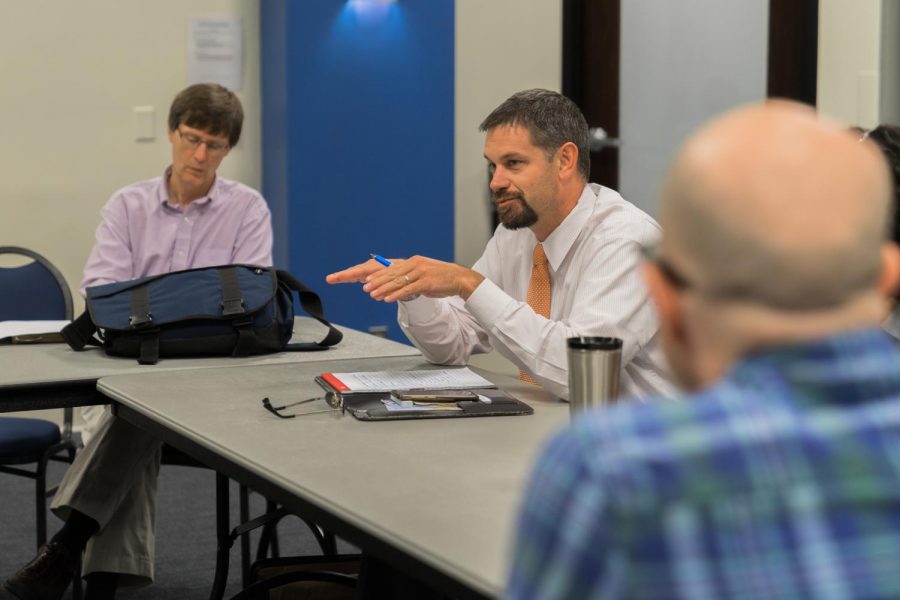An improved composting program will help boost the university’s efforts to “go green” as Marquette attempts to become more environmentally sustainable.
Marquette’s sustainability department is in the process of rolling out an improved compost program. The university will begin donating compost to Growing Power, an urban-farming initiative in Milwaukee, later this month. The compost program will take place at Straz Hall, Cobeen Hall, Schroeder Hall, the Tory Hill Cafe and the coffee grounds from the Brew.
Before switching to Growing Power, compost was donated to Kompost Kids, another local urban farming initiative. Recently, the amount of compost donated began to exceed the amount the organization could accommodate.
Mike Whittow, assistant to the vice president in the department of administration, is in charge of Marquette’s sustainability practices and one of the driving forces behind the upgraded compost program.
“It starts with Sodexo employees being trained on what can and cannot be thrown into compost,” he said. “Basically, it’s just putting stuff in bins twice a week, and then Growing Power will come pick up the bins and replace them.”
The improved composting initiative is one of many steps taken to increase Marquette’s environmental sustainability over the past few years, as environmental awareness has risen throughout the country. Many sustainable practices are in place, such as a single stream recycling program and a food donation program. Marquette was even named one of seven “Green Colleges” in Wisconsin in April by the Princeton Review.
While Marquette has made some progress in terms of sustainability, there is still a long way to go.
Student Initiatives
Marquette is doing an “okay job,” said David Mullins, a sophomore in the College of Engineering and president of Students for an Environmentally Active Campus. Mullins said he would like to see many more steps taken toward making Marquette one of the leading schools in green technology. He still believes, however, that Marquette is on the right track to becoming more sustainable.
“From our perspective, there are always ways we could improve, and we’re always fighting to do more all the time,” Mullins said. “But I wouldn’t say that we are terrible either. I think Marquette does consider environmental stewardship. So it really is a part of Marquette and we really appreciate that, but we always think there could be more.”
Mullins said that the upcoming composting project at Marquette is a big step to reducing some of the food waste.
“We have students who are very passionate about post-consumer compost, and (putting cafeteria scraps into a compost bin) would be a great step because (cafeteria waste) is an alarming amount of waste,” Mullins said.
SEAC’s mission is to create a greener campus, and it is trying to do so by chipping away at problems all over campus.
“We take on different projects throughout the year, and we try and find those areas that need improvement,” Mullins said. “One area would be energy efficiency within the buildings – particularly the dorms. I mean, heating systems where people leave their windows open over the winter, that’s not efficient.”
Mullins said leaving lights on is a problem that could be resolved by having more motion-sensor lights that turn off automatically after the room has been empty for a certain amount of time.
Last year, SEAC’s “Don’t Dump, Donate” donation program collected clothing, leftover food and used furniture that may have ended up in dumpsters. In total, SEAC was able to collect about 25 used futons and donate them to Habitat for Humanity Restore, as well as clothing and food.
“That was a great way we could collect what might have been normally wasted at the end of the year,” Mullins said. “(The end of the year) is a very wasteful time for a college campus, and we were able to turn it into something productive.”
Administrative Support
Jame Schaefer, a professor in the department of theology, is in the process of attempting to add an interdisciplinary major in global ecology to the curriculum along with Marquette associate professor of political science McGee Young. Schaefer said SEAC has played an important role in increasing sustainability awareness on campus.
“I think the activities SEAC has engaged in are really impressive,” Schaefer said. “They are able to propose and implement these various sustainability ideas, and it just baffles me that they have the time to do it. They are so dedicated and so committed.”
Mullins said he has many goals for Marquette, but he would mostly like to see more progress being made in renewable energy efforts.
“Personally, one of the areas that most interests me is renewable energy, so I think that I’d like to see Marquette take some big steps towards getting (more), whether it is in the form of solar panels or just starting to get energy from wind power,” Mullins said. “I think that is a big area that could be unique if Marquette moved towards renewable energy.”
Mullins said to get these things accomplished, they need student support and funding. Neither of these initiatives is in the works at this time.
“It’s a matter of getting a lot of students on (the side of sustainability), because Marquette, at its core, is for the students,” Mullins said. “If we could get the student population to be interested in environmental stewardship and moving to become a greener university, then we could start pushing toward being one of the top universities.”
Mullins said the biggest roadblock to seeing sustainable initiatives is the need for a general understanding and urge to move toward a more sustainable university.
“It’s very difficult for other people to see, especially when there is the issue of money in the way,” Mullins said. “It does involve investments and effort. One of the bigger goals of SEAC is educating the Marquette community and the Milwaukee community to show the importance of why we need to become more sustainable.”
He added that becoming sustainable is often worth the monetary investment.
“You can save money, and that’s a great thing,” Mullins said. “But other times it’s not necessarily just money: you’re helping out the future generations.”
Whittow said while Marquette focuses a great deal on sustainability, students have to start raising awareness for additional changes to take place.
“Our goal is to create more awareness on campus and become a focal point in southeastern Wisconsin,” Whittow said. “Marquette being a Catholic, Jesuit university does a very good job with social justice and the social aspects of sustainability. Environmentally, we’ve had a recycling program since the early 1990s, which is pretty good compared to other schools.”
Whittow said although the sustainability programs in place are successful, there is always room for improvement.
“The university has always been sustainable from the aspect of social justice. That goes back way to 1881,” Whittow said. “But (the initiative to become a full-fledged environmental school) was starting in 2007.”
Whittow said his ultimate goal is to see Marquette get close to “zero waste” for the entire university, but added that it isn’t going to happen overnight.
“Sustainability is more of a journey than it is a destination,” Whittow said. “You’ll never hear anybody say they are totally, 100 percent sustainable. You can always improve on certain things. There is stuff you do very, very well. Then there is stuff where you could do better.”
Kevin Gilligan, general manager for Sodexo at Marquette, said Sodexo is responsible for many of the sustainability initiatives which are already offered, including composting.
“At Marquette, Sodexo is directly responsible for many sustainability initiatives on campus, and we also support the university and its efforts,” Gilligan said in an email. “We work very closely with Mike Whittow and other university departments to continue to drive Marquette’s sustainability program forward.”
Gilligan added that Marquette’s recognition for its sustainability efforts means the university is making strides in going green.
“We’ve been recognized by numerous external organizations for our achievements, and it’s very exciting to see our initiatives come to life at Marquette,” Gilligan said. “At Sodexo, we believe that sustainability goes beyond philanthropy and good intentions. Every day we work hard to set the benchmark in areas such as sustainability, diversity and inclusion, wellness and the fight against hunger.”
Gilligan said Sodexo has created the Better Tomorrow Plan, a “global promise for sustainability,” as a road map of its goals for the next 10 years.
“The plan, which includes 14 commitments, has measurable targets that we are working toward as a company,” Gilligan said.
Some of these goals include “reducing carbon intensity across Sodexo’s various partnerships, reducing water intensity throughout their sites, developing health and wellness solutions and promoting choices with reduced sugar, salt and fats.”
Looking Forward
Schaefer said although the university is taking strides for a more sustainable campus, she would like to see more changes made.
“There was an assessment of our campus in 1998 … on how to make our buildings more energy efficient,” Schaefer said. “There were a lot of practical ideas, and students were engaged in the assessment and were actually paid to do some of the assessing. I’d like to see what kind of progress they’ve made in implementing some of the ideas that were recommended.”
Schaefer said her biggest concern is making the current buildings greener.
“All of our buildings need to be made more energy efficient in many ways,” Schaefer said. “It would be too idealistic to think that we could ever achieve any kind of LEED certification for our existing buildings, but the architect and the university are certainly making endeavors with new buildings right now to get them LEED-certified.”
LEED certification is a program that provides third-party verification of energy efficient buildings. It is the leading indicator of green engineering. Eckstein Hall, Zilber Hall and McCabe Hall are some of the LEED-certified buildings on campus.
“We have a long way to go, but there has to be a commitment on the part of the university to make sure it does happen,” Schaefer said.

